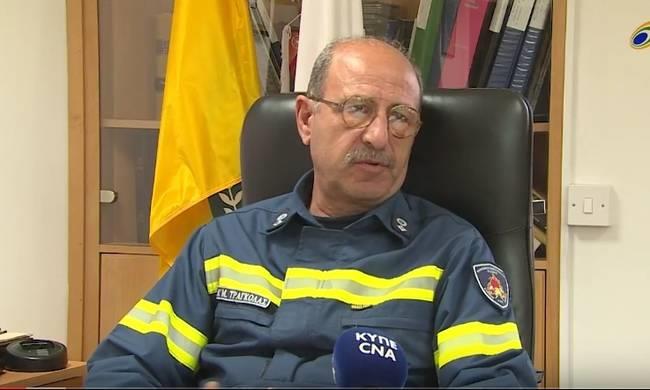A former chief fire officer has backed the current fire chief’s efforts during the recent devastating wildfire, saying he did his best with the personnel available, and instead blamed the government for failing to provide sufficient resources.
Markos Trangolas, who once led the national fire service, warned that even if Andreas Gregoriou, director general of the agriculture ministry and appointed emergency coordinator during crises such as last month’s fire, had not been on leave, he was not the right person for the role and would have struggled regardless.
“He did not have the necessary experience or background. Fortunately, he was not present, because he would have faced many difficulties,” Trangolas told CyBC.
He criticised the leadership structure during the fire response, arguing that the overall coordinator must have full control over all operations, which did not happen.
“The fire chief officer, who is the parliamentary coordinator, was managing his own forces. But the overall coordinator must have full control over all operations. That didn’t happen.”
Trangolas also accused the government of undermining Cyprus’ firefighting capacity by repeatedly rejecting requests to hire additional personnel, weakening the country’s ability to respond effectively.
“When the fire service asked for personnel twice, the government did not approve the recruitment,” he said.
“If fewer people were sent, it is not the chief fire officer’s job to make do, it is the government’s responsibility.”
His comments have added to growing criticism of how authorities handled Cyprus’ worst wildfire in recent memory, despite promises of improved preparedness.
The wildfire broke out on July 23, during one of the most intense heatwaves of the summer. It began near the village of Malia and spread rapidly across 13 communities in the Limassol district. Two people lost their lives, at least sixteen were injured, homes and farmland were destroyed.
Local residents, many forced to flee with no warning, have staged protests since the disaster. Some said the first help came not from emergency services, but from neighbours and volunteers. An official inquiry is under way, with a ten-member team from the US Bureau of Alcohol, Tobacco, Firearms and Explosives arriving on August 5 to assist Cypriot authorities. They are expected to complete initial field inspections and submit a report within ten days.
While arson was initially suspected, police have since said there is no evidence of foul play. A criminal investigation remains open, with around 65 witness statements collected so far.
Just four months before the disaster, in March 2025, the government unveiled new wildfire readiness measures, including 25 new fire engines and a pledge to deploy additional aircraft. By June, officials confirmed eleven firefighting planes and four helicopters would be available for the summer.
But after the Limassol fire, critics said key resources were delayed and coordination was lacking when it mattered most. A previous study by wildfire expert Gabriel Xanthopoulos, formerly of the Mediterranean Agronomic Institute “Dimitra”, had warned of these risks. His report called for a unified national body and regional restructuring, reforms which were never implemented.
Trangolas defended those on the front lines, saying firefighters did all they could with the limited support provided. But he stressed that no emergency plan, however well-designed, can succeed without the people to carry it out.
“Put yourselves in the chief fire officer’s position. He did everything he could with the resources he had.”






Click here to change your cookie preferences